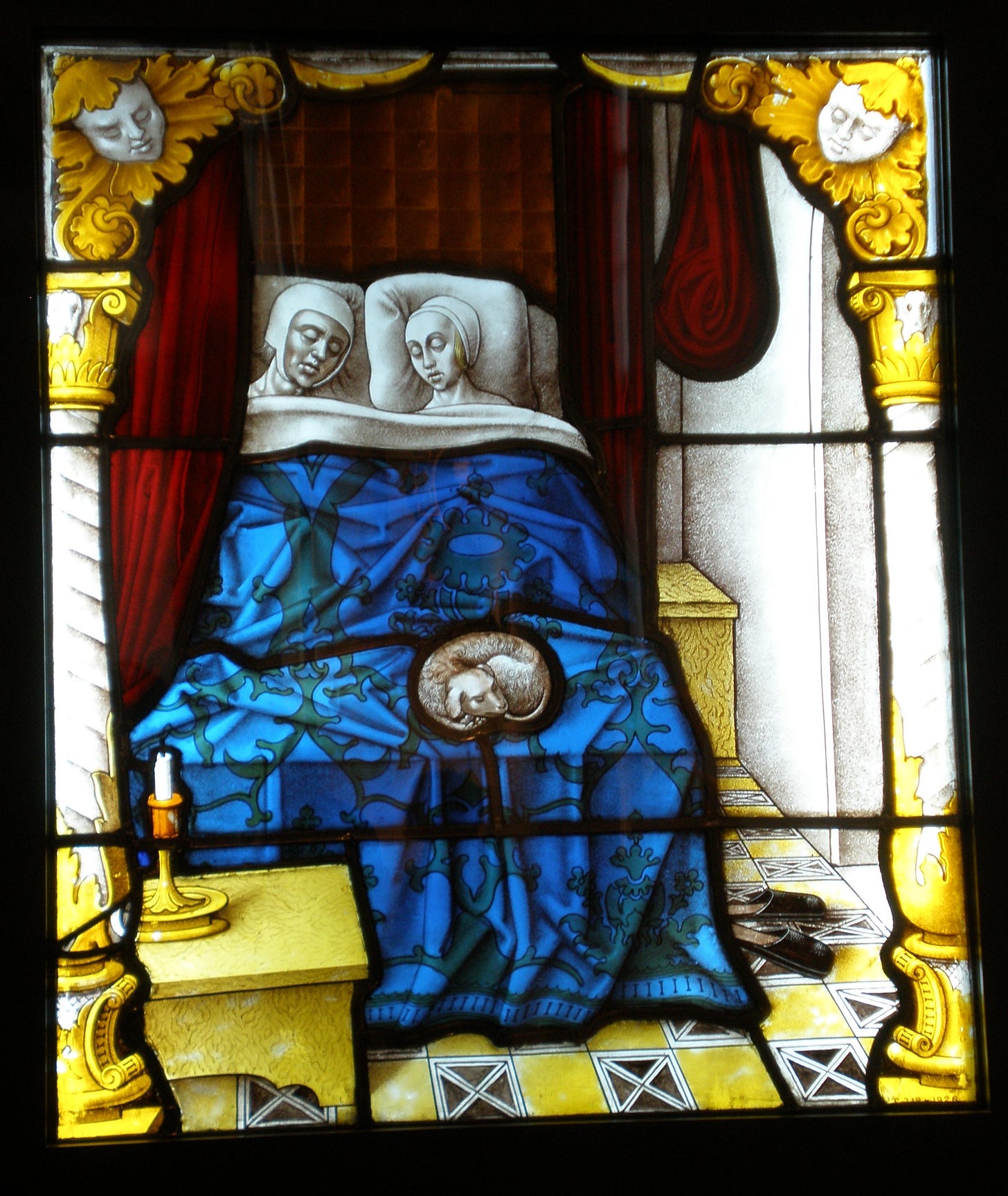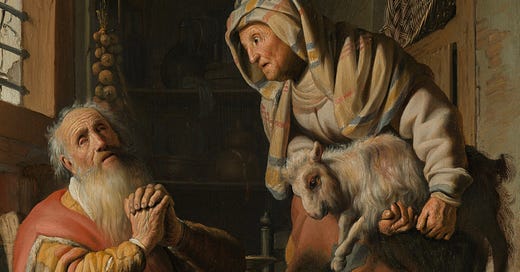Lessons in Healing the World
Rounding out the Book of Tobit, we talk about saving the world, tackle listener questions, and share our favorite takeaways.

Episode 13 of “Bad” Books of the Bible is live! Tell a friend (or an enemy) about it.
Healing the world
We have finally made our way through the Book of Tobit. In today’s episode, Jamey and I dip into the mailbag and answer some listener questions. We also discuss several key takeaways. But before we do either, we spend a moment reflecting on the idea of tikkun olam, a Jewish concept which refers to healing the world.
I (Jamey) encountered this idea in Caleb Wilde’s memoir, Confessions of a Funeral Director. Recall that one of Tobit’s preoccupations is burying the dead. The book starts off with him not only talking about his charitable deeds, but also burying bodies of fellow Jews left to rot in the street. Not only is this a selfless act—the dead have no way to repay the kindness—but it was also an act of rebellion.
The Assyrian king, Sennacherib, was inflicting revenge on the Jewish people in Nineveh for his failed adventures in Israel. He wanted their bodies rotting in the street as an icon of his anger and as a warning of what happens to people who oppose him. But then there was Tobit, sneakily going and burying the dead regardless.
It’s an act of subversion—but not for its own sake. Rather, it’s subversion for the sake of healing. Through all his charitable deeds, including burying the dead, Tobit is working to set something right in his corner of the world.
Presence and proximity
Wilde talks about this concept and the difference it can make in the world and for others:
Along the way, I learned the Jewish concept of tikkun olam, which means “the healing of the world” and is accomplished through presence in the midst of pain. It can be summarized in the phrase “I’m here with you and I love you” and is accomplished through simple acts of presence. It became a rallying cry for me in my work as a funeral director. Rachel Naomi Remen, in an interview with Krista Tippett, describes it as “a collective task. It involves all people who have ever been born, all people presently alive, all people yet to be born. We are all healers of the world. . . . It’s not about healing the world by making a huge difference. It’s about the world that touches you.” Presence and proximity before performance.
As Wilde reflects on the concept, he explains his growing awareness of people living this out in all sorts of contexts:
As I took that to heart, I started to see small, everyday examples of tikkun olam everywhere: When a mother comforts a child, she’s healing the world. Every time someone listens to another—deeply listens—she’s healing the world. A nurse who bathes the weakened body of an elderly patient is healing the world. The teacher who invests herself in her students is healing the world. The plumber who makes the inner workings of a house run smoothly is healing the world.
Every one of these actions represents someone working in their small corner of the world, the patch of reality for which they are individually responsible. He then talks about how we can apply it to ourselves:
When we practice presence and proximity, we may not change anyone, we may not shift culture or move mountains, but it’s a healing act, if for none other than ourselves. When we do our work with kindness—no matter what kind of work—if we’re doing it with presence, we’re practicing tikkun olam.1
From chapter 1 to the end in chapter 14, Tobit embodies this idea multiple times in the story. And that’s especially helpful when we think about, as Wilde says, shifting culture and moving mountains.
More service, fewer screeds
There’s tendency in our culture to look at embattled quarters and charge the mountain—to try accomplish the big, radical thing, whatever it is. And for most of us that looks like screeching at each other on social media. We’re guilty of this as much as anyone. But Tobit offers a different paradigm.
“Acquire the Spirit of Peace and a thousand souls around you will be saved,” said St. Seraphim of Sarov. That’s what both Tobit and Wilde are getting at. Instead of the big radical thing—saving a thousand souls—we need to tackle the little things for which we have actual responsibility.
If we’re all doing the little thing we’re actually responsible for—which are usually far more inconvenient and far closer to us than a screed on social media—then we’re doing the work that will help the culture, that will help everyone.
This idea is embedded in not only the Book of Tobit, but also the early Christian social ethos. In episode 4 we discussed the anonymous second-century Letter to Diognetus that describes the way Christians behave in society. We didn’t quote in the Episode Guide, but here are two lengthy and worthwhile extracts from chapters 5 and 6 of that letter.
For the Christians are distinguished from other men neither by country, nor language, nor the customs which they observe. . . . But, inhabiting Greek as well as barbarian cities, according as the lot of each of them has determined, and following the customs of the natives in respect to clothing, food, and the rest of their ordinary conduct, they display to us their wonderful and confessedly striking method of life. . . . They are in the flesh, but they do not live after the flesh. They pass their days on earth, but they are citizens of heaven. They obey the prescribed laws, and at the same time surpass the laws by their lives. They love all men, and are persecuted by all. They are unknown and condemned; they are put to death, and restored to life. They are poor, yet make many rich; they are in lack of all things, and yet abound in all; they are dishonoured, and yet in their very dishonor are glorified. They are evil spoken of, and yet are justified; they are reviled, and bless; they are insulted, and repay the insult with honour; they do good, yet are punished as evil-doers. When punished, they rejoice as if quickened into life . . . yet those who hate them are unable to assign any reason for their hatred.
To sum up all in one word—what the soul is in the body, Christians are in the world. The soul is dispersed through all the members of the body, and Christians are scattered through all the cities of the world. The soul dwells in the body, yet is not of the body; and Christians dwell in the world, yet are not of the world. The invisible soul is guarded by the visible body, and Christians are known indeed to be in the world, but their godliness remains invisible. The flesh hates the soul, and wars against it, though itself suffering no injury, because it is prevented from enjoying pleasures; the world also hates the Christians, though in nowise injured, because they abjure pleasures. The soul loves the flesh that hates it, and [loves also] the members; Christians likewise love those that hate them. The soul is imprisoned in the body, yet keeps together that very body; and Christians are confined in the world as in a prison, and yet they keep together the world.2
This is the life of Tobit. And it’s the life to which every believer is called, living as a healing presence in the world.
Into the mailbag!
We answer several listener questions this week, including:
“Why are they called ‘bad’ if they are in the canon?”
“Is this similar to bad boys? Are we supposed to date these books but not marry them?”
“Does the Jewish canon contain these books?”
“If the Apocrypha books were included by Protestants in the Bible during the Reformation era, why were they later removed?”
“If Apocrypha was initially included in the Jewish tradition, why do we say that Christians are responsible for its preservation?”
“I heard someone speculate that Tobit is an early example of novelization. . . . I believe that fiction can and should teach truth. But is that pushing it too far?”
“If it were fiction and uninspired, what’s it doing in the Bible?”
We also address another tricky question: “What about consummation of the marriage between Tobias and Sarah?” The Vulgate mentions that the couple waited three days to consummate their marriage. How are we supposed to think about that—especially if that idea is a later addition to the book and not in the original?

Also, by popular demand, we say more about Tobias’s dog! Beyond that, we also discuss our personal takeaways from the book, three each. It’s angels, it’s romance, it’s all that and more.
Coming next week. . . .
We close out our series on Tobit with two expert interviews. Our first is next week. We talk with Amy-Jill Levine, professor of New Testament and Jewish Studies at Vanderbilt.
Caleb Wilde, Confessions of a Funeral Director (HarperOne, 2018), 51–52.
“Letter of Diognetus,” translated by Alexander Roberts and James Donaldson, New Advent.





Bummer you chose to ignore the massive difference between Lutheran/Anglican and Reformed/Non-Conformist positions.
I was waiting till you finished out Tobit before making recommendations to others to listen. As an Anglican, I’m really sad I can’t recommend this podcast to “Protestants” who don’t understand our own beliefs about these books.